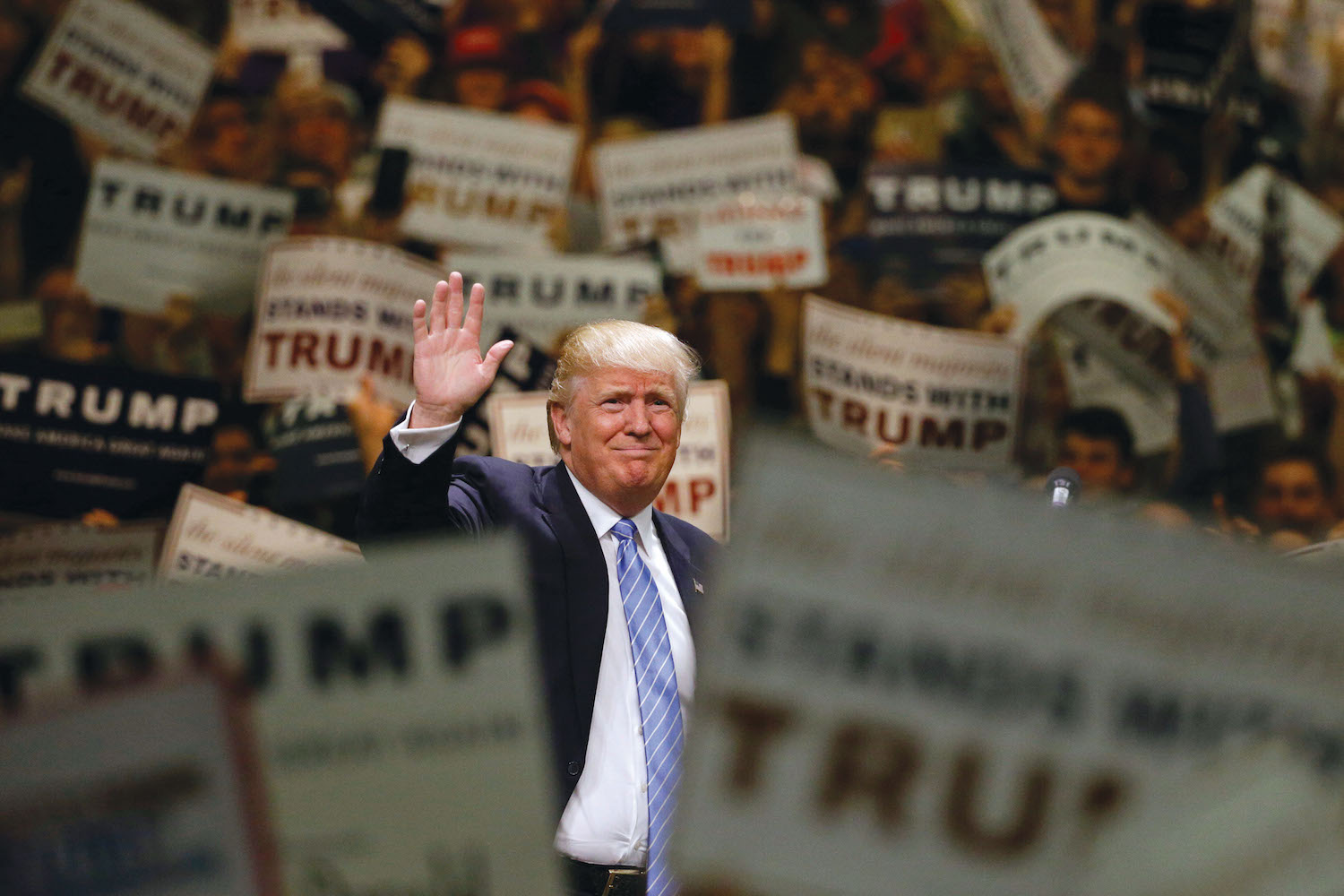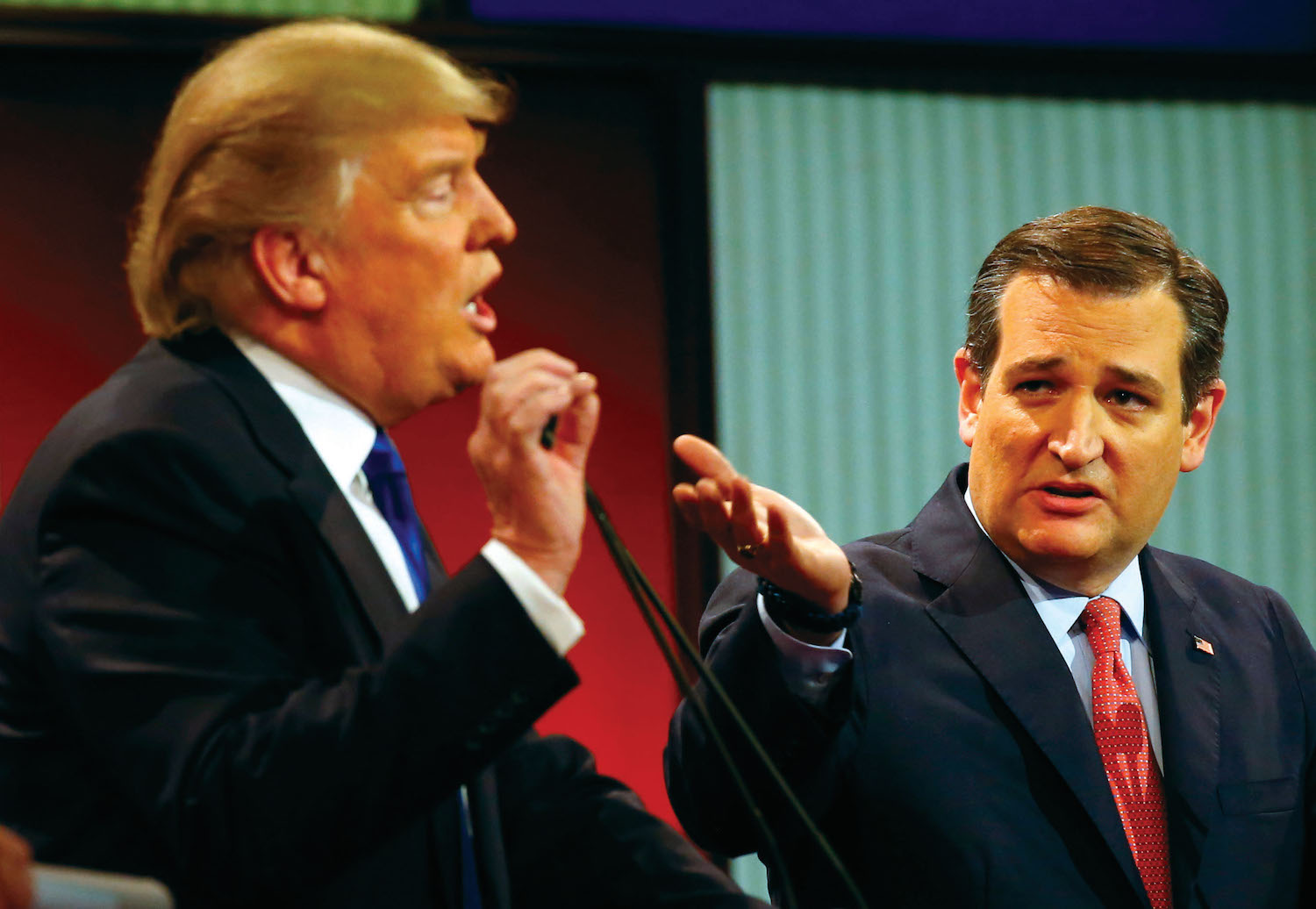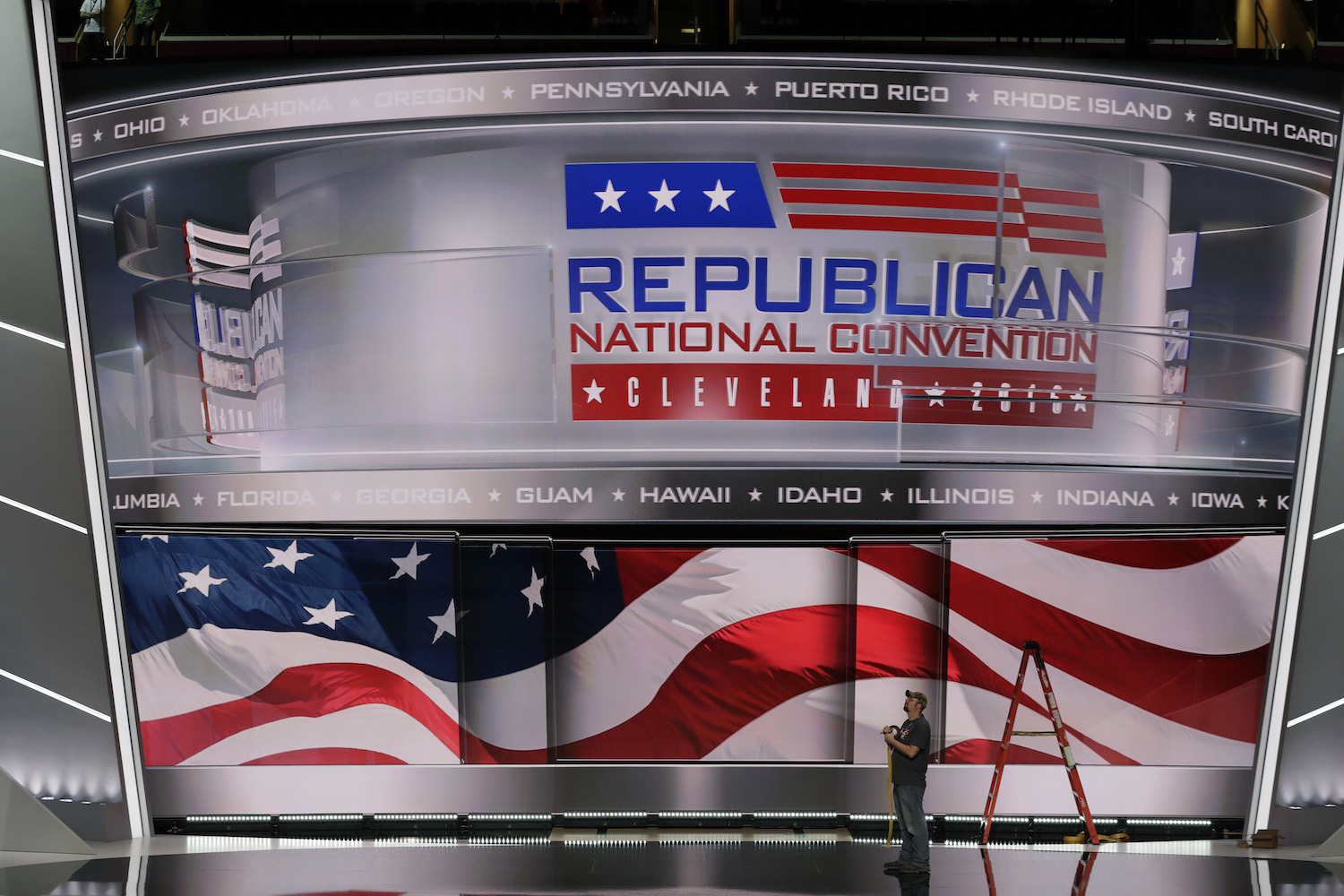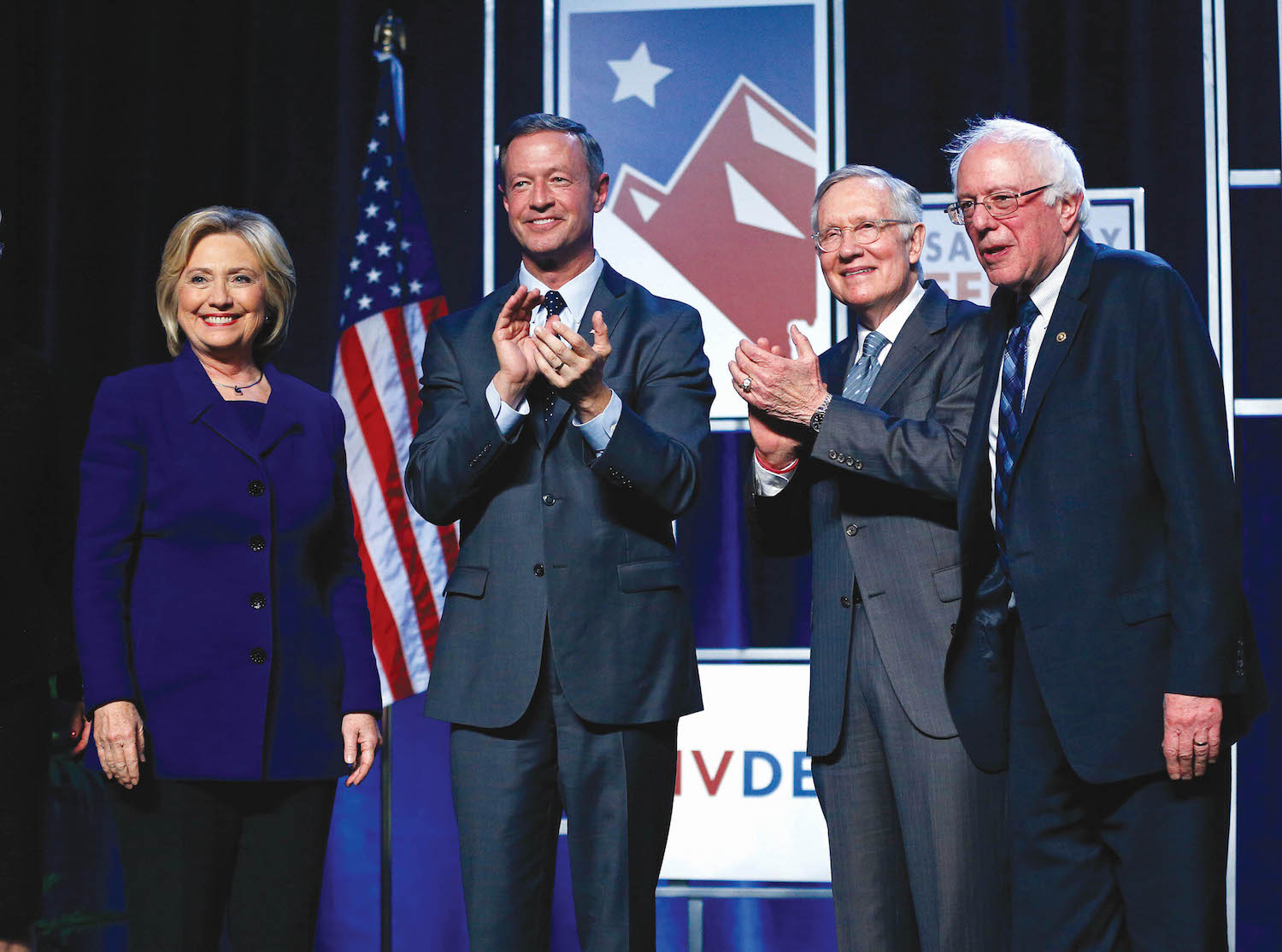Shortly before Donald Trump took his famous escalator ride to his presidential announcement speech, he was polling as low as 1 percent of the vote among Republicans nationally. “Trump has a better chance of cameoing in another ‘Home Alone’ movie with Macaulay Culkin — or playing in the NBA finals — than winning the Republican nomination,” wrote election analyst Harry Enten.
Enten’s post on Trump’s implausibility was headlined, “Why Donald Trump isn’t a real candidate, in one chart.” Within a year, Trump was the presumptive Republican nominee for president, defeating 16 other well-known GOP candidates in less time than it took for Hillary Clinton to beat Bernie Sanders.
Trump heads to the Republican National Convention ready to accept the party’s nomination to face off against Clinton in the general election. Even now, 13 million votes and 1,542 delegates later, anti-Trump forces within the party are still plotting ways to deny him that prize. If the destination was unexpected, so was the road that took Trump to Cleveland.
The celebrity businessman got this far by upending much of the conventional wisdom surrounding the 2016 presidential race. It was assumed the Republican nominating contest would be two primaries within a primary, with one candidate’s eventual path to victory coming via the conservative lane while another pursued the nomination through the moderate or establishment lane.
Before Trump entered the race, the expectation was that Scott Walker, Ted Cruz, Rand Paul and others would compete to be the top conservative candidate in the primaries. Jeb Bush, Chris Christie and John Kasich would seek the establishment nod. One propitious sign for Marco Rubio was that he had a foot in each camp and could theoretically ride either lane all the way to the convention.
Little of this mattered. The once unstoppable GOP establishment was almost totally impotent. Bush, Christie and Kasich never got close to the nomination — an especially embarrassing failure for Bush, the son and brother of the last two Republican presidents whose donors put up over $100 million in support of his futile effort.
Cruz outlasted the other conservatives only to wind up 5.7 million votes and 984 delegates behind Trump.
The candidate who turned out to have a foot in both the conservative and establishment lane, though he couldn’t really be characterized as either, was Trump. He won moderate to liberal Republicans in most primaries. He also carried the “somewhat conservative” voters.
Sometimes Trump did better than that. Consider New Hampshire, the first state he won. He beat Cruz by 13 points among very conservative voters and clobbered Kasich by 24 points among primary voters who were somewhat conservative. He won moderates by 5.
Trump tore through the Northeast, breaking 60 percent of the vote in New York, sweeping the Mid-Atlantic primaries and winning every New England state except for Maine, which held a caucus rather than a primary. He won Massachusetts by more than 30 points, beating runners-up Kasich and Rubio’s combined vote share by 13.
At the same time, Trump did well in the Bible Belt. He won Alabama, beating Cruz by 22 points. He won Mississippi, beating Cruz by 11. He ran 10 points ahead of Rubio in South Carolina. North Carolina, Arkansas, Louisiana and Kentucky were closer — and all Trump wins.

The candidate who turned out to have a foot in both the conservative and establishment lane, though he couldn’t really be characterized as either, was Trump. (AP Photo)
That isn’t the profile of the insurgent candidate Trump was when he began his campaign. It more closely resembles the combination of states the establishment candidate usually wins on his way to putting such an insurgency down and claiming the nomination.
“Trump has won most of the states, like the front-runner for the nomination usually does,” Republican strategist Mike DuHaime told the Washington Examiner. “Cruz has won a lot of the Santorum-Huckabee states, though he is a stronger candidate than either of them.”
Cruz ran a disciplined, data-driven, highly organized campaign with a familiar conservative playbook. He was a skilled debater with a much firmer grasp of policy details than Trump. His team regularly outhustled Trump’s in caucuses and vacuumed up delegates at state GOP conventions.
But Cruz rarely beat Trump when he wasn’t running under close to ideal circumstances. Texas was his home state, Oklahoma a neighbor. In Iowa, Trump pulled out of the last debate before the caucuses and had a lackadaisical ground game — and still only lost to Cruz by 3 points. In Utah, Trump was unpopular with Mormons while Cruz had Mitt Romney’s endorsement.
Wisconsin was probably Cruz’s most important victory in a state where he began competing with Trump on something like even terms. Even there, he had Gov. Walker’s endorsement in a rare state where the Republican power structure was popular with conservatives and some of the most important talk radio voices were reliably anti-Trump, following a week of Trump gaffes.
The Texas senator won the voters he was supposed to win — evangelicals, Tea Party conservatives, libertarians — some of the time. Trump won must-win contests like Pennsylvania and Indiana nearly all the time.
Whatever happens next, Trump prevailed in the primaries against the combined strength of the Republican establishment and the conservative movement. The big conservative magazines railed against his ideological apostasies on economics, social issues and foreign policy. If Ronald Reagan defined conservatism as a “three-legged stool,” Trump seemed content to saw all of them off.
The party’s donor class has kept its wallets shut in response to Trump’s candidacy. Fortunately for him, they didn’t invest heavily in anti-Trump efforts either.

Cruz ran a disciplined, data-driven, highly organized campaign with a familiar conservative playbook. But Cruz rarely beat Trump when he wasn’t running under close to ideal circumstances. (AP Photo)
The establishment disliked Cruz even more, never rallying to him when he was the last man standing against Trump and refusing to bankroll “Never Trump” efforts early when they might have made a difference because they feared Cruz would benefit. They placed their hopes in Rubio after Iowa and South Carolina, only to see them dashed in New Hampshire and Florida.
Rubio was the candidate Republican consultants would have designed in a laboratory: young, Hispanic, inclusive in his language, son of a bartender, from a swing state the party needs to win in November. Trump was the opposite: an old, rich white man who was perceived as insensitive, inherited wealth from his father and comes from a safe Democratic state. The voters, however, thought otherwise.
Trump had so few supporters among the Republican operatives and conservative journalists who usually comment on politics on television that the networks had to seek out new pro-Trump pundits for their analysis programs.
Scottie Nell Hughes went from someone who was well known in Tea Party circles to a person who could be parodied on “Saturday Night Live.” CNN developed the deepest bench in this area, ultimately hiring ousted Trump campaign manager Corey Lewandowski.
One of these newly famous pro-Trump pundits is Jeffrey Lord, a former Reagan White House political director and longtime columnist. “I really did think this was possible right from the get go,” Lord told the Examiner of Trump’s primary success. “He had the potential to go from being just another presidential candidate to being the leader of a movement, and this has now clearly come to pass.
“A lot of insiders saw him come down that Trump Tower escalator and wrote him off,” Lord added. “I came to think the Bush insiders in particular, foolishly piling up Washington lobbyist money, were just so into the old inside game that they were totally disconnected from what was going on in the country.
“This movement is genuine,” he said. “Trump is genuine.”
Without being well-schooled in conservative philosophy or wonkery, Trump tapped into some of the visceral sentiments common among Republican primary voters since the days of Richard Nixon’s “silent majority” — nationalism, patriotism, a desire for law and order, appreciation of police and military, skeptical of mass immigration or anything vaguely countercultural — better than candidates who knew the ins and the outs of the federal tax code.
“They don’t read Adam Smith or Edmund Burke, but they came from the same schoolyards and playgrounds and towns as we did,” said Pat Buchanan at the 1992 Republican National Convention. “They share our beliefs and convictions, our hopes and our dreams. They are the conservatives of the heart.”
“They are our people,” he continued. “And we need to reconnect with them. We need to let them know we know they’re hurting. They don’t expect miracles, but they need to know we care.”

Even now, as Trump heads to Republican National Convention with 13 million votes and 1,542 delegates, anti-Trump forces within the party are still plotting ways to deny him that prize. (AP Photo)
Reconnect with them Trump did. His rallies featured raucous chants of “Build the wall,” a reference to the border security fence their candidate pledged to construct at Mexico’s expense. “I will not let people die on the streets if I’m president,” he said in a Republican presidential debate.
Trump broke sharply with GOP elite consensus on trade, but arguably sided more with the party’s rank-and-file voters.
A recent poll for the Brookings Institution found that 60 percent of Republicans viewed trade deals as “mostly harmful;” a Caddell Associates survey found 59 percent of Republicans believe they most benefit other countries. Just 4 percent said these deals mostly benefit the United States.
Conservative free traders compare Trump’s trade policies to the Smoot-Hawley tariffs that are generally blamed for lengthening and worsening the Great Depression. But Smoot and Hawley were both Republican members of Congress. Their bill was signed into law by a Republican president.
“For a decade, Republican voters have signaled they wanted to protect Medicare, cut immigration, fight fewer wars and nominate no more Bushes,” wrote the Atlantic’s David Frum. “Their party leaders interpreted those signals as demands to cut Medicare, increase immigration, put boots on the ground in Syria and nominate another Bush.”
With the possible exception of the boots he’d put on the ground to fight the Islamic State, Trump says he will give these voters what they want. His GOP supporters still downplay the distance between their candidate and some of the party’s orthodoxies.
“It is a conservative platform,” Eagle Forum’s Ed Martin told the Examiner about the platform being drafted ahead of the Republican convention. “Trump has a good presence here.” Martin’s organization, founded by longtime conservative activist Phyllis Schlafly, was roiled by her endorsement of Trump during the primaries.
Can Trump ride what brought him to Cleveland all the way to the White House? The Republican primary electorate is overwhelmingly white and therefore less likely to find his rhetoric on issues such as immigration off-putting. The general electorate is more diverse, and key swing states like Florida and Colorado have a large number of Hispanic voters.
In the primaries, Trump was more famous than most of his rivals. He could get far more television coverage than any of them and could keep lesser-known candidates from breaking through. His larger-than-life persona made the process, to say nothing of his 16 opponents, look small.

Clinton’s cordial relations with her party establishment means she will have the money for advertising and get-out-the-vote efforts, two areas where she is already ahead of Trump. (AP Photo)
Clinton is as famous as Trump after three decades in the public spotlight, eight years as first lady and four years as secretary of state. As the Democratic nominee, she can get media coverage too.
Trump’s differences with other Republicans helped him stand out in a field of 17. Against Clinton, Trump will confront a united party that is willing to come together and defend her no matter what while some of Trump’s fellow Republicans are either unwilling to support his heterodox positions or don’t know how.
Clinton’s cordial relations with her party establishment means she will have the money for advertising and get-out-the-vote efforts, two areas where she is already ahead of Trump. Her favorable ratings, while low, remain a tick higher than his in part because of Democratic unity.
Republicans are still nursing bruised feelings not only from ideological disagreements but Trump’s intensely personal primary season attacks on Cruz’s wife and father, Carly Fiorina’s face, George W. Bush’s claims about weapons of mass destruction in Iraq and John McCain’s war record.
Add to this the Republicans who think Trump is not only not a conservative but also morally and intellectually unfit for the presidency, and you can see how this convention could quickly become contentious.
The task for Trump in Cleveland is enormous: quell an anti-Trump delegate rebellion, unite the party and put on a media event that showcases his campaign in a positive light without letting outside disruptions like massive protests undermine him, all with the goal of erasing Clinton’s lead nationally and in the battleground states.
Can lightning really strike twice?
“It is entirely possible that he can win in November,” Lord said. “He has a real chance of carrying my home state of Pennsylvania, for example. If he can do that, yes, he can win.”
